51.1.2.3.4.6 (51 > 18)
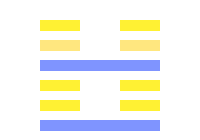
51.1.2.3.4.6 (51 > 18) - THE KĂN HEXAGRAM.
- 1. The first line, undivided, shows its subject, when the movement approaches, looking out and around with apprehension, and afterwards smiling and talking cheerfully. There will be good fortune.
- 2. The second line, divided, shows its subject, when the movement approaches, in a position of peril. He judges it better to let go the articles (in his possession), and to ascend a very lofty height. There is no occasion for him to pursue after (the things he has let go) ; in seven days he will find them.
- 3. The third line, divided, shows its subject distraught amid the startling movements going on. If those movements excite him to (right) action, there will be no mistake.
- 4. The fourth line, undivided, shows its subject, amid the startling movements, supinely sinking (deeper) in the mud.
- 6. The topmost line, divided, shows its subject, amidst the startling movements (of the time), in breathless dismay and looking round him with trembling apprehension. If he take action, there will be evil. If, while the startling movements have not reached his own person and his neighbourhood, (he were to take precautions), there would be no error, though his relatives might (still) speak against him.
51.1.2.3.4.6 (51 > 18) - Shock
One extends one's study to related fields in order to understand how the whole thing works.
Bing DeepL Google Yandex51.1.2.3.4.6 (51 > 18) - Shock
One extends one's study to related fields in order to understand how the whole thing works.
Bing DeepL Google Yandex51.1.2.3.4.6 (51 > 18) - Kán, l’ébranlement
Kán : tonnerre, effroi répandu, crainte.
- 1. Le tonnerre approchant, on est plein d’effroi ; puis, quand il est passé, on sourit et on parle tous ensemble (on passe de la crainte à la joie).
- 2. Quand le tonnerre gronde, le danger arrive, on croit devoir tout abandonner et se retirer en un lieu sûr et élevé. Qu’on ne s’obstine pas à rechercher alors ce qu’on a abandonné ; on le retrouvera quelque temps après. (Quand le danger sera passé.)
- 3. Le tonnerre émeut, agite ; il pousse à agir justement.
- 4. Le tonnerre approchant trouble et interdit [avant même l’éclair].
-
6. Le tonnerre répand l’effroi et fait partout regarder avec trouble et crainte. S’il atteint et frappe, il causera un grand mal. (Ou : il corrige le mal.) Mais s’il ne frappe ni tel personnage, ni ses voisins, ce ne sera point un mal et fera seulement jaser les habitants d’une même maison.
Quand le tonnerre gronde, que l’orage éclate, le sage recherche la cause de ce fait (et tâche de profiter de l’avertissement céleste).
51.1.2.3.4.6 (51 > 18) - Le choc
On étend son étude à des domaines connexes afin de parvenir à comprendre le fonctionnement de l'ensemble.
Bing DeepL Google Yandex51.1.2.3.4.6 (51 > 18) - Megrázkódtatás
- 1. Nevethet miután meglátja.
- 2. Ne keresse ami elveszett.
- 3. Meglátva a szakadást otthagyja őket.
- 4. Meg kell szabadítania magát a többiektől mielőtt tovább mehetne.
- 6. Elvesztette a leggyengébbet, visszafogottnak kell maradnia míg nem változnak.
The trigrams
The trigrams are combinations of three yin and yang lines. The three bottom lines of the hexagram form the lower trigram and represent the inner situation. The three top lines form the upper trigram and represent the outer situation.
Upper trigram: The thunder The mountain


Lower trigram: The thunder The wind


The formation: 51
What is already there
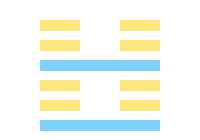
51 - THE KĂN HEXAGRAM.
Kăn gives the intimation of ease and development. When (the time of) movement (which it indicates) comes, (the subject of the hexagram) will be found looking out with apprehension, and yet smiling and talking cheerfully. When the movement (like a crash of thunder) terrifies all within a hundred lî, he will be (like the sincere worshipper) who is not (startled into) letting go his ladle and (cup of) sacrificial spirits.
Bing DeepL Google Yandex51 - Shock
Something is coming which enables the identification of a problem.
Bing DeepL Google Yandex51 - Shock
Something is coming which enables the identification of a problem.
Bing DeepL Google Yandex51 - Kán, l’ébranlement
Kán : tonnerre, effroi répandu, crainte.
Kán« tonnerre, effroi se répandant, appréhension ». Le tonnerre survenant répand l’effroi ; par l’effroi, les rires et les causeries s’arrêtent court. Le tonnerre terrifie cent lis, mais ne doit pas arrêter la cuiller du sacrifice aux esprits (le sacrifice) 1.
1 Le tonnerre peut arrêter tout mais pas empêcher le sacrifice.
Texte
Le tonnerre approchant répand l’effroi ; les rires, les causeries s’arrêtent subitement. Le tonnerre terrifie cent lis, mais ne doit pas arrêter la cuiller du sacrifice aux esprits.
Commentaire
Cet effroi a d’heureux résultats. Les rires et les causeries gardent ainsi la mesure. Le tonnerre terrifie ce qui est loin comme ce qui est près. Mais on doit, quand même, garder le temple des ancêtres, les autels des génies du sol et présider aux sacrifices. (Malgré l’effroi, on ne peut les interrompre.)
Symbolisme
Le tonnerre répété forme l’hexagramme. Le sage, plein de crainte et de scrupules prudents, observe et corrige.
51 - Megrázkódtatás
Valami közelít ami lehetővé teszi a probléma felismerését.
Bing DeepL Google Yandex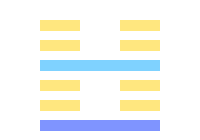
51.1 (51 > 16) - THE KĂN HEXAGRAM.
The first line, undivided, shows its subject, when the movement approaches, looking out and around with apprehension, and afterwards smiling and talking cheerfully. There will be good fortune.
Bing DeepL Google Yandex51.1 (51 > 16) - Kán, l’ébranlement
Kán : tonnerre, effroi répandu, crainte.
Le tonnerre approchant, on est plein d’effroi ; puis, quand il est passé, on sourit et on parle tous ensemble (on passe de la crainte à la joie).
Bing DeepL Google Yandex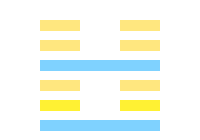
51.2 (51 > 54) - THE KĂN HEXAGRAM.
The second line, divided, shows its subject, when the movement approaches, in a position of peril. He judges it better to let go the articles (in his possession), and to ascend a very lofty height. There is no occasion for him to pursue after (the things he has let go) ; in seven days he will find them.
Bing DeepL Google Yandex51.2 (51 > 54) - Kán, l’ébranlement
Kán : tonnerre, effroi répandu, crainte.
Quand le tonnerre gronde, le danger arrive, on croit devoir tout abandonner et se retirer en un lieu sûr et élevé. Qu’on ne s’obstine pas à rechercher alors ce qu’on a abandonné ; on le retrouvera quelque temps après. (Quand le danger sera passé.)
Bing DeepL Google Yandex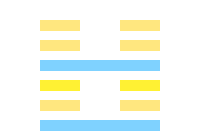
51.3 (51 > 55) - THE KĂN HEXAGRAM.
The third line, divided, shows its subject distraught amid the startling movements going on. If those movements excite him to (right) action, there will be no mistake.
Bing DeepL Google Yandex51.3 (51 > 55) - Kán, l’ébranlement
Kán : tonnerre, effroi répandu, crainte.
Le tonnerre émeut, agite ; il pousse à agir justement.
Bing DeepL Google Yandex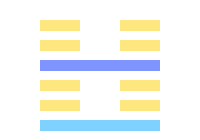
51.4 (51 > 24) - THE KĂN HEXAGRAM.
The fourth line, undivided, shows its subject, amid the startling movements, supinely sinking (deeper) in the mud.
Bing DeepL Google Yandex51.4 (51 > 24) - Being bogged down
One has to free oneself from others before one can go any further.
Bing DeepL Google Yandex51.4 (51 > 24) - Being bogged down
One has to free oneself from others before one can go any further.
Bing DeepL Google Yandex51.4 (51 > 24) - Kán, l’ébranlement
Kán : tonnerre, effroi répandu, crainte.
Le tonnerre approchant trouble et interdit [avant même l’éclair].
Bing DeepL Google Yandex51.4 (51 > 24) - Être embourbé
On doit se libérer des autres avant de pouvoir aller plus loin.
Bing DeepL Google Yandex51.4 (51 > 24) - Megrázkódtatás
Meg kell szabadítania magát a többiektől mielőtt tovább mehetne.
Bing DeepL Google Yandex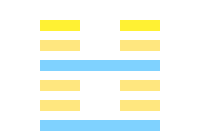
51.6 (51 > 21) - THE KĂN HEXAGRAM.
The topmost line, divided, shows its subject, amidst the startling movements (of the time), in breathless dismay and looking round him with trembling apprehension. If he take action, there will be evil. If, while the startling movements have not reached his own person and his neighbourhood, (he were to take precautions), there would be no error, though his relatives might (still) speak against him.
Bing DeepL Google Yandex51.6 (51 > 21) - Taking refuge in the heights
One has lost the weakest, so one keeps a low profile until they change.
Bing DeepL Google Yandex51.6 (51 > 21) - Taking refuge in the heights
One has lost the weakest, so one keeps a low profile until they change.
Bing DeepL Google Yandex51.6 (51 > 21) - Kán, l’ébranlement
Kán : tonnerre, effroi répandu, crainte.
Le tonnerre répand l’effroi et fait partout regarder avec trouble et crainte. S’il atteint et frappe, il causera un grand mal. (Ou : il corrige le mal.) Mais s’il ne frappe ni tel personnage, ni ses voisins, ce ne sera point un mal et fera seulement jaser les habitants d’une même maison.
Quand le tonnerre gronde, que l’orage éclate, le sage recherche la cause de ce fait (et tâche de profiter de l’avertissement céleste).
51.6 (51 > 21) - Se réfugier dans les hauteurs
On a perdu les plus faibles alors on reste discret jusqu'à ce qu'ils changent.
Bing DeepL Google Yandex51.6 (51 > 21) - Megrázkódtatás
Elvesztette a leggyengébbet, visszafogottnak kell maradnia míg nem változnak.
Bing DeepL Google YandexIn the making: 18
What is poised to happen

18 - THE KÛ HEXAGRAM.
Kû indicates great progress and success (to him who deals properly with the condition represented by it). There will be advantage in (efforts like that of) crossing the great stream. (He should weigh well, however, the events of) three days before the turning point, and those (to be done) three days after it.
Bing DeepL Google Yandex18 - Disorder
One needs to abandon their affairs and make oneself available to patiently soften one's most embarrassing flaws, so that one can inspire confidence and be engaged by those who can help them.
Bing DeepL Google Yandex18 - Disorder
One needs to abandon their affairs and make oneself available to patiently soften one's most embarrassing flaws, so that one can inspire confidence and be engaged by those who can help them.
Bing DeepL Google Yandex18 - Kù, l’élimination de la chose pourrie
[color=blue]Kū : délibération, embarras, trouble, soucis.
Texte
La délibération, chose éminemment utile, fera triompher des difficultés. On doit délibérer trois jours avant d’agir ; puis trois jours après (sur les conséquences).
Symbolisme
C’est le vent sous la montagne. Le fort au-dessus, le petit au- dessous ; soumission chez l’un, droiture ferme chez l’autre ; c’est ce que représente le Koua kū. Aussi le grand doit encourager le peuple et développer les vertus.
Commentaire
Si l’on délibère sagement, le monde sera bien gouverné. Quand on va à une affaire, on doit délibérer trois jours avant et trois jours après.
18 - Le désordre
On a besoin d'abandonner ses affaires et se rendre disponible pour adoucir patiemment ses défauts les plus gênants, afin de pouvoir inspirer confiance et être engagé par ceux qui peuvent nous aider.
Bing DeepL Google Yandex18 - Rendetlenség
Fel kell hogy hagyjon az üzlettel
és hogy rendelkezésre állva türelmesen tompítsa a legtöbb kínos hibát, hogy képes legyen bizalmat sugallni és segítőtársakra leljen.
The nuclear hexagram: 39.1.2.3.4.5 (39 > 54)
The nuclear hexagram is the association of the two inner trigrams (lines 2,3,4 and 3,4,5). It represents the root, or the origin of the situation.
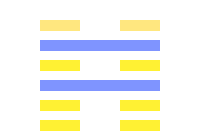
39.1.2.3.4.5 (39 > 54) - THE KIEN HEXAGRAM.
- 1. From the first line, divided, we learn that advance (on the part of its subject) will lead to (greater) difficulties, while remaining stationary will afford ground for praise.
- 2. The second line, divided, shows the minister of the king struggling with difficulty on difficulty, and not with a view to his own advantage.
- 3. The third line, undivided, shows its subject advancing, (but only) to (greater) difficulties. He remains stationary, and returns (to his former associates).
- 4. The fourth line, divided, shows its subject advancing, (but only) to (greater) difficulties. He remains stationary, and unites (with the subject of the line above).
- 5. The fifth line, undivided, shows its subject struggling with the greatest difficulties, while friends are coming to help him.
39.1.2.3.4.5 (39 > 54) - Busting
One gets the evidence one had hoped for through a combination of circumstances.
Bing DeepL Google Yandex39.1.2.3.4.5 (39 > 54) - Busting
One gets the evidence one had hoped for through a combination of circumstances.
Bing DeepL Google Yandex39.1.2.3.4.5 (39 > 54) - Kién, l’obstacle
Kién : Difficulté, danger, noble hardiesse.
-
1. Si l’on va (courageusement) aux choses difficiles, on reviendra comblé de louanges.
Il convient d’être ferme. - 2. Si le prince et ses ministres ont difficultés sur difficultés, ce n’est point (nécessairement) parce qu’ils recherchent leur propre avantage (ou : cela ne dépend pas nécessairement d’eux-mêmes).
- 3. L’un va aux difficultés et revient après au repos. Ou : qui va aux difficultés (courageusement) revient aux profits (en obtient).
-
4. Un autre y va et revient uni à ceux qui les ont partagées.
Il faut être fidèle dans ses fonctions. - 5. C’est dans les difficultés que les amis se montrent.
39.1.2.3.4.5 (39 > 54) - Prendre sur le fait
On reçoit les preuves que l'on espérait grâce à un concours de circonstances.
Bing DeepL Google Yandex39.1.2.3.4.5 (39 > 54) - Bizonytalanság
- 1. Mások ellenállnak mert nem ellenőrizte, így közvetítőt kér hogy felülvizsgálják a munkáját.
- 2. Sok nehézség mások táplálásában.
- 3. Azt akarják hogy visszajöjjön.
- 4. A többiek nincsenek ott így várnia kell rájuk.
- 5. Problémák amiket nem oldhat meg egyedül, látogatókat kap amikor szükség van rájuk.
Ruler
The starting situation

51.6 (51 > 21) - THE KĂN HEXAGRAM.
The topmost line, divided, shows its subject, amidst the startling movements (of the time), in breathless dismay and looking round him with trembling apprehension. If he take action, there will be evil. If, while the startling movements have not reached his own person and his neighbourhood, (he were to take precautions), there would be no error, though his relatives might (still) speak against him.
Bing DeepL Google Yandex51.6 (51 > 21) - Taking refuge in the heights
One has lost the weakest, so one keeps a low profile until they change.
Bing DeepL Google Yandex51.6 (51 > 21) - Taking refuge in the heights
One has lost the weakest, so one keeps a low profile until they change.
Bing DeepL Google Yandex51.6 (51 > 21) - Kán, l’ébranlement
Kán : tonnerre, effroi répandu, crainte.
Le tonnerre répand l’effroi et fait partout regarder avec trouble et crainte. S’il atteint et frappe, il causera un grand mal. (Ou : il corrige le mal.) Mais s’il ne frappe ni tel personnage, ni ses voisins, ce ne sera point un mal et fera seulement jaser les habitants d’une même maison.
Quand le tonnerre gronde, que l’orage éclate, le sage recherche la cause de ce fait (et tâche de profiter de l’avertissement céleste).
51.6 (51 > 21) - Se réfugier dans les hauteurs
On a perdu les plus faibles alors on reste discret jusqu'à ce qu'ils changent.
Bing DeepL Google Yandex51.6 (51 > 21) - Megrázkódtatás
Elvesztette a leggyengébbet, visszafogottnak kell maradnia míg nem változnak.
Bing DeepL Google YandexCorrection
The direction where the ruler is going to bend
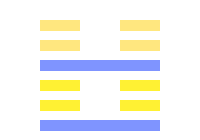
51.1.2.3.4 (51 > 46) - THE KĂN HEXAGRAM.
- 1. The first line, undivided, shows its subject, when the movement approaches, looking out and around with apprehension, and afterwards smiling and talking cheerfully. There will be good fortune.
- 2. The second line, divided, shows its subject, when the movement approaches, in a position of peril. He judges it better to let go the articles (in his possession), and to ascend a very lofty height. There is no occasion for him to pursue after (the things he has let go) ; in seven days he will find them.
- 3. The third line, divided, shows its subject distraught amid the startling movements going on. If those movements excite him to (right) action, there will be no mistake.
- 4. The fourth line, undivided, shows its subject, amid the startling movements, supinely sinking (deeper) in the mud.
51.1.2.3.4 (51 > 46) - Shock
One gets enthusiastic, so one proves right to those who reveal intimate details.
Bing DeepL Google Yandex51.1.2.3.4 (51 > 46) - Shock
One gets enthusiastic, so one proves right to those who reveal intimate details.
Bing DeepL Google Yandex51.1.2.3.4 (51 > 46) - Kán, l’ébranlement
Kán : tonnerre, effroi répandu, crainte.
- 1. Le tonnerre approchant, on est plein d’effroi ; puis, quand il est passé, on sourit et on parle tous ensemble (on passe de la crainte à la joie).
- 2. Quand le tonnerre gronde, le danger arrive, on croit devoir tout abandonner et se retirer en un lieu sûr et élevé. Qu’on ne s’obstine pas à rechercher alors ce qu’on a abandonné ; on le retrouvera quelque temps après. (Quand le danger sera passé.)
- 3. Le tonnerre émeut, agite ; il pousse à agir justement.
- 4. Le tonnerre approchant trouble et interdit [avant même l’éclair].
51.1.2.3.4 (51 > 46) - Le choc
On s'enthousiasme alors on donne raison à ceux qui dévoilent des détails intimes.
Bing DeepL Google Yandex51.1.2.3.4 (51 > 46) - Megrázkódtatás
- 1. Nevethet miután meglátja.
- 2. Ne keresse ami elveszett.
- 3. Meglátva a szakadást otthagyja őket.
- 4. Meg kell szabadítania magát a többiektől mielőtt tovább mehetne.

